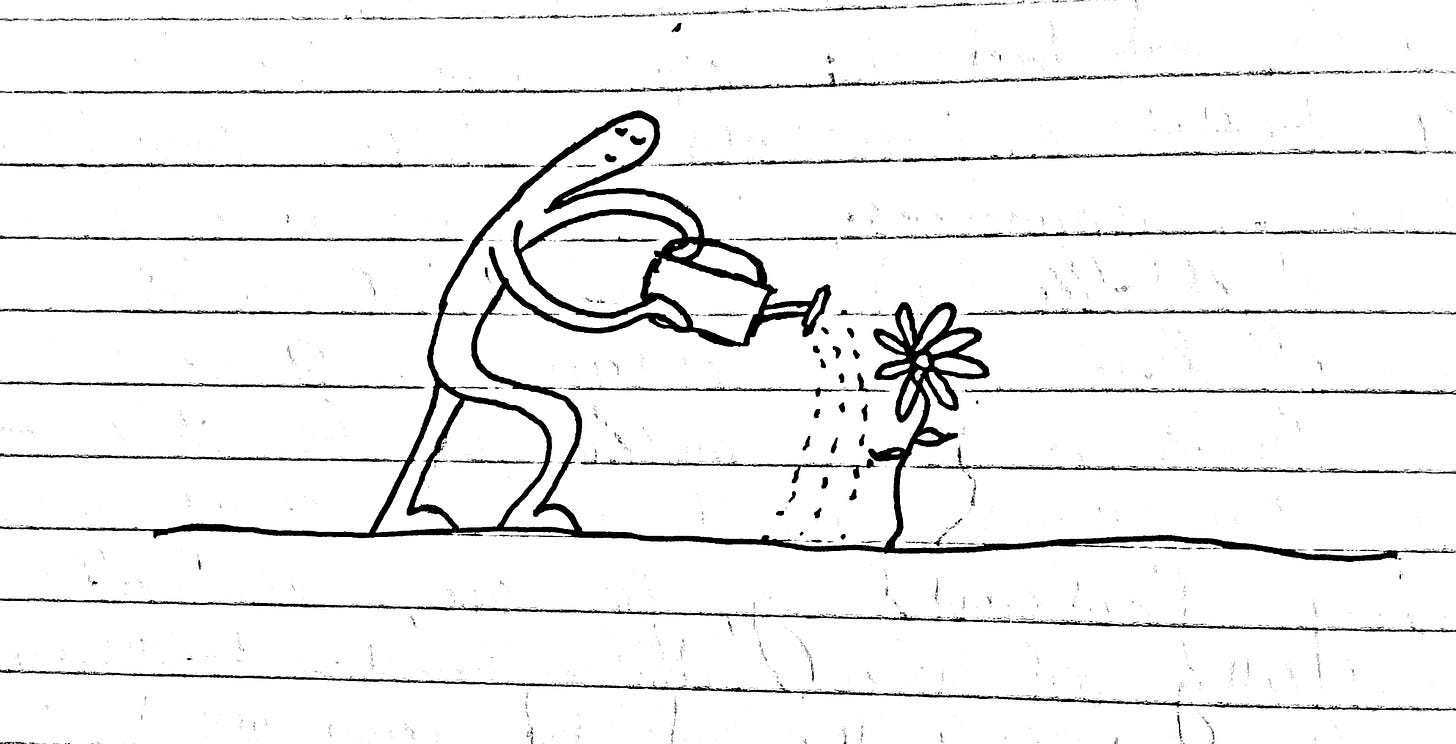Welcome to Art and Survival, a weekly-ish newsletter documenting one theatre-loving boy’s attempt to build a secure life filled with creative acts. You can find out more in the introductory post here.
This week: A reflection on the question, “Does creative labor matter?”
The professor was standing in the lecture hall, on the last day of the class with all the sophomores, during the first semester she taught, and she grew teary-eyed as she described her devotion to her field. She had given the time and energy of her life to that field, and she only hoped to pass her passion on to at least one of her students.
Watching her grow teary eyed behind the podium, the students thought about the party that weekend, and what would be served at the dining hall, and about the paper they still hadn’t started that was due in a few hours.
For some, though, who were rooted in the classroom, and who heard and held on to every word the professor had said about Lorraine Hansberry and Zoot Suit and the Golden Age of Musicals and Thornton Wilder and all those other dramatic writers “from 1950 to the present” — for some, the tears in the professor’s eyes represented commitment, and raised a greater question, a question which could be applied to any field at all: does our work matter?
Of course it matters. The questions is, to whom does it matter? And why?
It might be useful to look at this question in two ways – first, from the perspective of the individual creator, and second, from the perspective of how our work fits into a greater collective system. For the purpose of this reflection, the work that will be considered is creative labor, thought it’s possible that some of these points are relevant to other worlds of work.
For individuals living an artistic life, or striving to, the work is the way they move through the world. In a recent interview with Talk Easy, playwright-turned-filmmaker Annie Baker described her writing as the way she makes sense of her life. For this storyteller, the act of telling the story becomes an active part of her life’s process; her stories are the “excrement of time”1 as she experiences it.
Greek amphoras for wine or oil,
Hopi vases that held corn, are put in museums
but you know they were made to be used.
[from “To be of use,” a poem by Marge Piercy]
The individual creator might also have a more selfish aim, like the actor who wants to be famous (or rich, or both). To this artist, creative labor matters as a means to an end; unlike the artist to whom the matter is in the process, this artist’s work matters only when it leads to recognition or remuneration.
For some, artmaking is as natural as breathing. In Kazuo Ishiguro’s Never Let Me Go, characters affirm their essential humanity through creative acts – doodles in the sketchbook, sculptures, paintings. The act of forming the thing places attention on the formational activity going on inside of the maker. In other words, making art externalizes the invisible creative labor involved in living.
Within a greater system of social movement, art can matter to the degree of its influence on politics. For instance, a solo performance undertaken the month or two before an election which remembers the history of suffrage in the US might compel one audience member – who had previously decided to abstain from the vote – to cast a ballot. This movement, however minor in the ocean of electoral activity, would be an undeniably real action the art has taken on politics and a power structure. Of course, one could ask about the impact of a single vote, but that analysis is best left to a broader conversation about art and politics.
Another invisible system to which art matters is the imagination. According to Jack Zipes, professor and author of Breaking the Magic Spell: Radical Theories of Folk & Fairy Tales, fairy tales are an essential cultural influence on children’s lives. Zipes argues that the fairy tale shapes behavior by introducing archetypical stories where certain actions are connected with certain consequences. The ability to imagine outcomes is molded by these stories told, and the views implicit in their telling. In a fundamental way, the art of storytelling and view-making is the essential matter that people build lives upon.
For the reason that stories help people imagine a possible future, the art of telling queer stories matters to me. I wish it would have been easier for me to imagine a future when I was growing up.
Creativity is a constant state of change, so to make a decision about whether creative acts matter or not seems beside the point; we can either choose to participate in the imagining and making of things, or not. Whether the act of making matters is unknowable. Does it matter to you? Does it matter to someone you love? Does that help you do it?
Maybe creative work just matters to me, and to my wellness. Maybe it’s how I process time and live. Maybe it’s something else, yet unknown, dark matter at an unseen edge.





A person told me something I wrote had a positive impact on their life. One person is enough. The rest I’m doing for me.